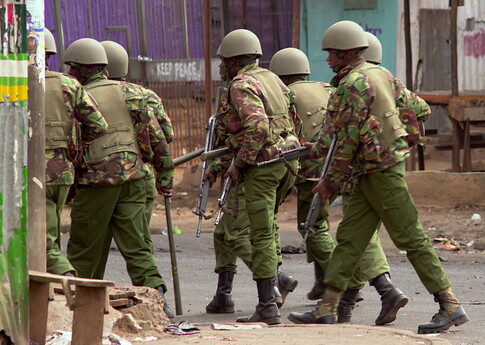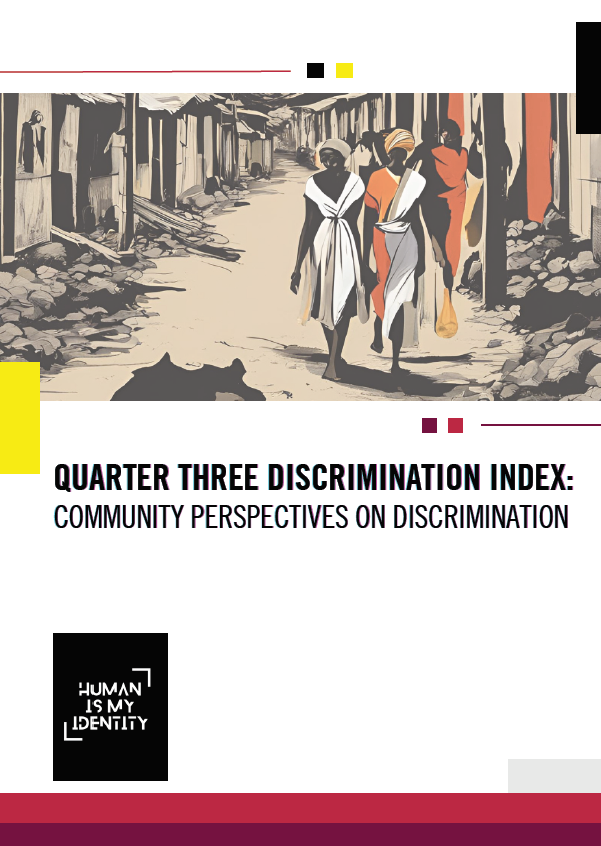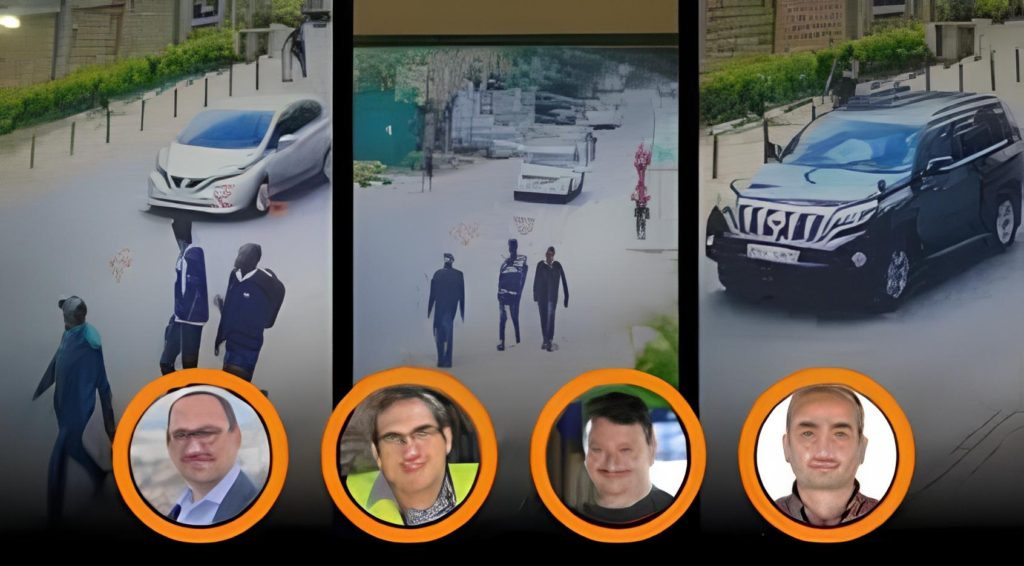In this issue, we bring you the latest updates and impactful stories from our ongoing efforts to defend and uplift human rights in Kenya. From groundbreaking research on discrimination to urgent calls for policy changes, each story highlights the resilience of communities, the power of advocacy, and the importance of standing up for justice. Discover key findings from our Quarter Three Discrimination Index, learn how to join the movement to abolish the death penalty, and stay informed about alarming developments in refugee rights.
In this issue:
Justice Deferred: The Fight for Accountability in the Case of Baby Samantha Pendo
In July 2024, a landmark High Court ruling marked a critical step towards justice for victims of police violence, as 11 police commanders and officers were found to have a case to answer in the tragic case of Baby Samantha Pendo. These officers now face charges of crimes against humanity, which include murder, torture, and rape—47 charges that underscore the scale and severity of their alleged actions. This ruling brought a glimmer of hope for the families and communities devastated by the brutality following the 2017 General Election.
However, in a surprising and disappointing turn of events, the Office of the Director of Public Prosecutions (ODPP) submitted an application to defer the plea-taking of the implicated police commanders. This deferment is deeply disheartening for the survivors, the families of victims, and the human rights community, as it delays justice for those affected by the tragic events of 2017.
Through the Police Reforms Working Group, we expressed unwavering solidarity with all victims and survivors of police violence. Standing firm in the belief that the law must protect its citizens and hold violators accountable, we have called on both the ODPP and the Judiciary to act swiftly and effectively. We are urging these institutions to prioritise the interests of the victims and survivors who have waited seven long years for a semblance of justice.
The Police Reforms Working Group believes that delivering justice in this case will not only provide closure for affected families but also set a powerful precedent for police accountability. If upheld, it could mark a pivotal moment in police reform—ensuring that officers who violate the law and misuse their authority face meaningful consequences.
This deferment is a setback for many survivors and families who have already endured the trauma of losing loved ones and suffering abuse at the hands of those who swore to protect them. Now, with heightened resolve, they continue to demand accountability, hoping that this case will be a turning point in the long journey toward genuine police reform in Kenya.

Quarter Three Discrimination Index Released: Community Perspectives on Discrimination

In our latest issue, we’re excited to share the findings from the Quarter Three Discrimination Index, a unique and revealing look at discrimination through the eyes of communities in four Kenyan counties: Nairobi, Nakuru, Kilifi, and Wajir. This index, rooted in a qualitative participatory action research (PAR) study, delves into the everyday realities of discrimination as reported directly by community members. By involving these communities in the research process, we’ve centred their voices and perspectives, capturing the deeply personal and often painful ways discrimination affects lives.
Key Findings
- Participants generally understood the concept of negative differential treatment but noted that discrimination has not yet become a recognised community-wide concern. Many cases are seen as individual issues rather than systemic ones.
- Across all four counties, gender-based discrimination emerged as a pressing issue, with women citing barriers to employment and political involvement.
- SGBV was reported as a major issue in Nairobi, Kilifi, and Wajir counties. Victims shared that they often lack the physical, financial, and psychological support needed to recover and reintegrate into their communities after traumatic experiences.
- Young people expressed frustration over limited job opportunities, often obstructed by corruption, tribalism, and favouritism. In Nairobi, older adults continuing to work are seen as limiting opportunities for the youth.
- LGBTQ+ persons reported facing judgment based on appearance and clothing and experiencing barriers to employment. In Nakuru, LGBTQ+ persons often find religious spaces inaccessible due to perceptions of them as social outcasts.
- Across counties, PWDs are often viewed as incapable of working, affecting their access to jobs and fair treatment in the workplace.
- Across all counties, socio-economic discrimination was highlighted, with disadvantaged individuals citing unresponsive public offices and inaccessible services.
- Domestic workers with HIV disclosed that they commonly face discrimination based on their health status.
- There were mixed responses regarding reporting mechanisms, with some participants expressing doubts about their ability to report incidents of discrimination within their communities
These findings shed light on the various and intersecting forms of discrimination affecting Kenyan communities, underscoring the need for structural change and more supportive systems.
Download the full Discrimination Index to gain a deeper understanding of these community insights and join the conversation on how we can work towards an inclusive, fair, and just society for all.
As we continue our mission to amplify community voices and address systemic issues, we invite you to participate in our Quarter Four Discrimination Index survey. Your insights are invaluable to understanding the evolving landscape of discrimination across Kenyan communities. By sharing your experiences and perspectives, you contribute to creating a comprehensive picture of how discrimination impacts different groups and what actions are needed to foster change. Your voice matters—help us shape a more equitable future by taking part in the Q4 survey today.
Take Action to Abolish the Death Penalty: Sign Our Open Letter to Parliament
We invite you to join us in urging Members of Parliament to take decisive action toward abolishing the death penalty in Kenya. Although Kenya has not conducted an execution since 1987, and has an established practice of refraining from carrying out executions, it still lacks an official moratorium. Death sentences are still imposed by the courts, signalling the urgent need for legislative reform to end capital punishment once and for all.
Kenya has made significant strides in this direction. In October 2016, former President Uhuru Kenyatta commuted the death sentences of 2,747 individuals to life imprisonment. A year later, in December 2017, the Supreme Court’s ruling in Francis Karioko Muruatetu v. Republic declared the mandatory death sentence for murder cases unconstitutional, granting judges the discretion to apply alternative sentences based on individual case circumstances.
Ongoing Legislative Efforts for Abolition
As of 2023, four critical bills aiming to abolish the death penalty are under consideration in Parliament:
- Preservation of Public Security (Amendment) Bill, 2023 – Seeks to eliminate the death penalty for offences related to public security
- Legal Aid (Amendment) Bill, 2023 – Proposes removing death penalty references from the Legal Aid Act.
- Prisons (Amendment) Bill, 2023 – Aims to amend the Prisons Act to abolish the death penalty and its methods of execution.
- Penal Code (Amendment) Bill, 2023 – Seeks to amend the Penal Code to abolish capital punishment entirely.
These bills reflect a growing commitment to human rights and justice, signalling a monumental shift toward full abolition.
We urge you to join the movement to end the death penalty in Kenya by signing our open letter to Parliament. By calling on lawmakers to take these historic steps, we can help Kenya lead by example and reinforce our commitment to dignity, justice, and human rights for all. Sign the letter today.
Kenya’s Complicity in Forced Returns Violates Refugee Rights and Undermines Global Trust
We are gravely alarmed by the abduction of seven Turkish asylum seekers in Nairobi on October 18, 2024. Mustafa Genç, his son Abdullah Genç, Hüseyin Yeşilsu, Necdet Seyitoğlu, Öztürk Uzun, Alparslan Taşçı, and his wife Saadet Taşçı were reportedly seized by unknown individuals. While Abdullah Genç, Necdet Seyitoğlu, and Saadet Taşçı have since been released, Öztürk Uzun, Alparslan Taşçı, and Hüseyin Yeşilsu remain unaccounted for and at immediate risk of refoulement—a serious breach of international human rights law. Shockingly, the Government of Kenya has admitted that its own law enforcement and foreign affairs agencies played a role in the forced return of Mustafa Genç, Öztürk Uzun, Alparslan Taşçı, and Hüseyin Yeşilsu from Kenya to Turkey. This egregious act contravenes the principle of non-refoulement, a foundational concept of refugee protection enshrined in the 1951 United Nations Refugee Convention and its 1967 Protocol, the 1969 OAU Convention on Refugees, and Kenya’s own 2021 Refugee Law. These agreements explicitly prohibit returning refugees to countries where they risk persecution, torture, or other severe rights violations. Kenya’s actions not only violate its own national laws but also its longstanding commitments to international humanitarian standards.
This disturbing incident undermines the three decades of trust and security that Kenya has provided to nearly 780,000 refugees who currently reside on its soil, fleeing violence, war, and persecution. Kenya’s role as a safe haven has long been respected globally. However, this forced return sends a dangerous message that Kenya’s humanitarian protections may be compromised, even for diplomatic, commercial, or political gain.

International refugee law allows returns only when a refugee is proven to pose a serious threat to national security, or if they have been duly convicted of crimes that endanger the safety of others. No evidence has been presented that these individuals posed any such threat. Even in rare instances when exceptions apply, strict procedural safeguards are in place to ensure fairness and protection. Rather than returning these asylum seekers to a country they had fled, Kenya could have arranged for safe resettlement in a third country.
Kenya’s actions have placed four individuals in grave danger and undermined the nation’s reputation as a sanctuary for the persecuted. This serious breach of human rights stands in direct contrast to Kenya’s new role as a member of the United Nations Human Rights Council and casts a shadow over its upcoming Universal Periodic Review with the United Nations. We urge the Kenyan government to honour its refugee protection and human rights obligations, reaffirm its commitment to humanitarian principles, and prevent further refoulement.


